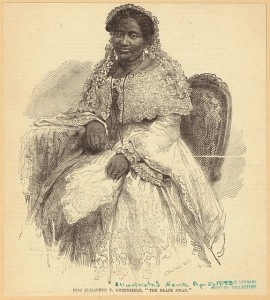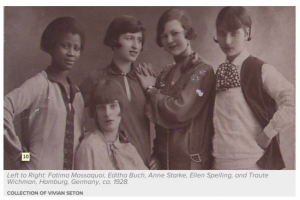

Early African-American elites traveled and lived abroad extensively…
Pioneering African-Americans of the 18th and 19th centuries traveled and lived abroad extensively, even in Africa. They traveled for education, recreation, professional employment and political advocacy, enjoying concourse with a wide variety of cultures and supporters.
Of course many blacks fled to Canada living as far west as British Columbia. Future Arkansas judge Mifflin Gibbs moved there in search of gold and while there, became a successful businessman and even a Canadian elected official.
Other 18th and 19th century blacks traveled or repatriated to the the Caribbean. Six-thousand black New Yorkers emigrated to Haiti en masse during the early 19th century, according to Black Gotham: A Family History of African-Americans in 19th Century New York City. John H. Rapier, Jr., an Alabama man who became a surgeon, traveled to Jamaica to study dentistry and to Haiti to gauge the quality of life in the newly independent republic. He also studied the latter in Central America.
Europe was also a popular destination. Famous singer Elizabeth T. Greenfield toured England and Ireland, giving a concert at Buckingham Palace for Queen Victoria. Paul Cuffee owned a shipping business that took him to Sweden and Russia. Alexander Crummell relocated to England to get his bachelor’s degree from Cambridge, then moved to Liberia for 20 years before returning to the United States. Some traveled to Europe in the course of their anti-slavery activism. Charles Lenox Remond went to London to as a delegate to the world anti-slavery convention in London in 1840, and refused to take his seat because women delegates were excluded.
Dred Scott v. Sanford severely curtailed the travel of free African-Americans, denying passports to those who had been accustomed to foreign travel. But the initial pervasiveness of travel within the community of 18th and 19th century black elites suggests that they enjoyed a wider degree of freedom and economic security than often reported. Juxtaposed against their peers’ widespread enslavement, the travel of black elites is a chilling reminder that black exceptionalism should never be equated with black freedom.
More random facts:
An African princess who stood unafraid against the Nazis
Between 1939 and 1946, Fatima Massaquoi penned one of the earliest known autobiographies by an African woman. But few outside of Liberian circles were aware of it until Palgrave McMillian published The Autobiography of an African Princess, edited by two historians and the author’s daughter.
She died in 1978, and her story could have died with her.
For the most part, it did. That is, until Konrad Tuchscherer, St. John’s University specialist in African history and language, stumbled upon it on microfilm while conducting research.
Ultimately, his interest in the tale took on significance beyond the proliferation of that particular ancient West African written language. “It’s evidence that not only was there this thriving literary tradition among African people, but it was one that included women,” he says. “Fatima is a granddaughter of a queen, a literate and empowered woman.”
Determined to share the story, Tuchscherer hunted for contact information for Massaquoi’s only daughter, Vivian Seton, who lives in Maryland. Seton immediately agreed, insisting that her mother had predicted, on her deathbed, that one day “a man would call” and would want to publish her story. She joined Tuchscherer and Virginia State University historian Arthur Abraham, helping to coordinate a transcription and translation of the original text, and to find a publisher, which Tuchscher says was the most difficult part of the process.
What emerged when the book was published this week was a one-of-a-kind tale of a life lived on three continents, chronicling everything from insider views of traditional life and societies in Africa, to intense racism in other parts of the world.
In the 252-page volume, Massaqoui attends boarding school, plays violin for royalty and presidents and even finds herself at Nazi rallies. In Hamburg, Germany, her family hosted Marcus Garvey and his lieutenants while they attempted to secure visas for Liberia. She recalls entertaining him with her poetry. At Fisk, Massaqoui assisted Lorenzo Turner with his famous research on African linguistic retentions among the Gullah of South Carolina and Georgia. Later, with the help of the great African-American tenor Roland Hayes, she pursued a Ph.D. at Boston University.
***Information courtesy of Dominion of New York – http://www.dominionofnewyork.com/ and The Root- http://www.theroot.com/articles/history/2013/11/african_woman_s_story_revived_autobiography_of_an_african_princess.2.html***

